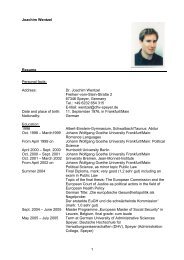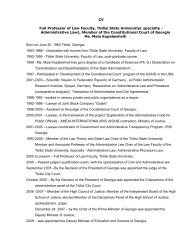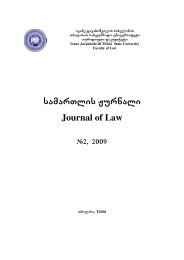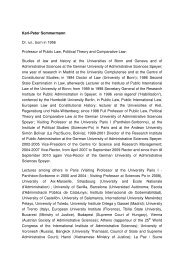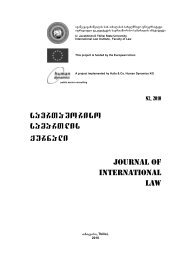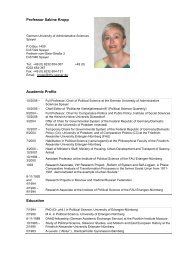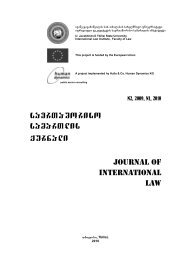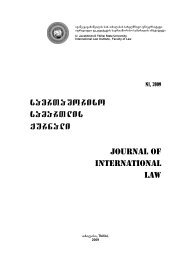Untitled
Untitled
Untitled
Create successful ePaper yourself
Turn your PDF publications into a flip-book with our unique Google optimized e-Paper software.
L. PAPIASHVILI, SOME ISSUES OF JUVENILE JUSTICE<br />
According to the Guidelines comprehensive<br />
child-centered juvenile justice process<br />
should be established; states should special<br />
procedures designed to take into account the<br />
specific needs of children; principle of minimum<br />
intervention should be developed; the<br />
placement of children in closed institutions<br />
should be reduced;<br />
Instruments Adopted by Council of<br />
Europe – Prior to 1989, the Council’s two main<br />
treaties – the European Convention for the<br />
Protection of Human Rights and Fundamental<br />
Freedoms (1950) (ECHR) and the European<br />
Social Charter (1961) did not contain<br />
any specific provisions relating to the rights<br />
of children. However, references to the rights<br />
of children can be found in several articles of<br />
the ECHR 4 .<br />
In 1996 European Convention on the<br />
Exercise of Children’s Rights was adopted.<br />
The objective of this Convention is to promote<br />
the [children’s] rights, to grant them procedural<br />
rights and to facilitate the exercise of<br />
these rights by ensuring that children are …<br />
informed and allowed to participate in proceedings<br />
affecting them before a judicial authority.<br />
The Convention strengthens and creates procedural<br />
rights of children and determines<br />
roles, duties and responsibilities of the state<br />
and its agents.<br />
Although Georgian legislative acts – Criminal<br />
Code, Criminal Procedure Code, and Prison<br />
Laws provide special treatment of juvenile<br />
offenders, it is too early to speak about the existence<br />
and development of juvenile justice in<br />
Georgia.<br />
Juvenile cases are tried in the common<br />
court. This fact shows that despite particular legal<br />
norms, Georgian justice does not consider<br />
juvenile legal procedure as an independent<br />
procedure, while it is principally and substantially<br />
different from common legal procedures<br />
of adults. Judges do not have discretionary<br />
power of individual approach to juvenile crimes.<br />
In general practice, the activities in the<br />
direction of education and correction of juvenile<br />
offenders are limited, which seriously impedes<br />
their further re-socialization.<br />
The overall design of the facilities in Georgia<br />
and physical environment is not in keen<br />
with the rehabilitative aim of juvenile justice.<br />
Juveniles are not guaranteed the benefit of<br />
meaningful activities or programmes that will<br />
assist them to develop their potential as members<br />
of society.. There is sant regard to the<br />
need of the detainees for privacy sensory stimuli,<br />
opportunities for association with peers and<br />
participation in education, work sport, physical<br />
exercise or leisure time activities as required<br />
by the UN Rules on Juveniles Deprived<br />
of their Liberty. .Sleeping accommodation did<br />
not meet the required standards, the food is<br />
inadequate and etc. But of far greater concern<br />
is the length of time for which children<br />
are locked up in cells and the consequent lack<br />
of exercise. The long periods of time spent by<br />
young people In the prison system makes it<br />
extremely difficult for them to be rehabilitated<br />
in the community. Family ties and community<br />
ties will have been lost, education neglected<br />
with little possibility of employment both due<br />
to the stigma of having been imprisoned and<br />
the failure to acquire any vocational skills.<br />
Although there are four social worker staff<br />
at the prison there appears to be no planning<br />
for when a child is released. Thus some children<br />
find themselves with no accommodation,<br />
job or skills on release, making the risk of reoffending<br />
high. There needs to be cooperation<br />
between probation and the staff in Avchala<br />
to ensure that a child’s release is properly<br />
planned and arrangements for the child’s support<br />
are in place and ensure that each child<br />
who has served a term of imprisonment has a<br />
discharge care plan before release.<br />
Despite the fact, that placing juveniles in<br />
custody is expensive, unfortunately there is a<br />
lack of community-based alternates to custody.<br />
Although the Criminal Code provides the<br />
judge with a range of possible non-custodial<br />
sanctions when sentencing, in practice, the<br />
options are few and there are an inadequate<br />
range of alternatives to detention.<br />
Under current procedure, once a child is<br />
arrested he/she will be detained in the police<br />
isolator for up to 48 hours while an investigation<br />
is conducted and a decision made as to<br />
whether there is evidence to charge the child.<br />
The conditions in the isolator do not at present<br />
conform to international minimum standards.<br />
The police lack flexibility: they do not have the<br />
power to release the child into the care of his<br />
parents or guardian during this time, to give a<br />
warning as an alternative to detention and investigation<br />
or generally to divert children away<br />
from the criminal justice system even if the<br />
child admits his/her guilt and confesses to the<br />
offence.<br />
171




